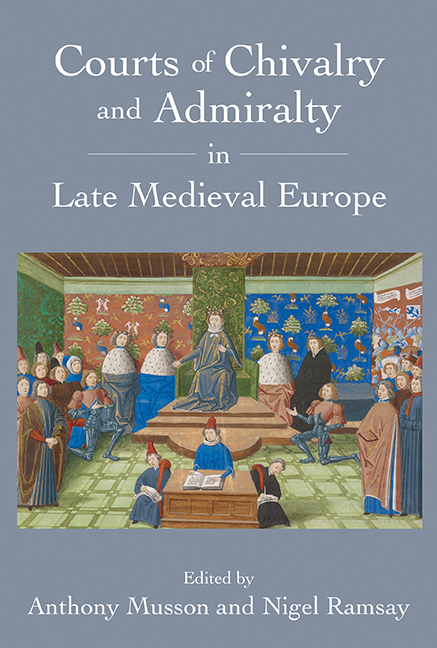Book contents
- Frontmatter
- Contents
- List of Illustrations
- Notes on Contributors
- Preface
- A Note on Editorial Practice
- List of Abbreviations
- Introduction
- Chapter 1 Heralds and the Court of Chivalry: From Collective Memory to Formal Institutions
- Chapter 2 French Armorial Disputes and Controls
- Chapter 3 Art, Objects and Ideas in the Records of the Medieval Court of Chivalry
- Chapter 4 Sir Robert Grosvenor and the Scrope–Grosvenor Controversy
- Chapter 5 From Brittany to the Black Sea: Nicholas Sabraham and English Military Experience in the Fourteenth Century
- Chapter 6 ‘Armed and redy to come to the felde’: Arming for the Judicial Duel in Fifteenth-Century England
- Chapter 7 The Jurisdiction of the Constable and Marshals of France in the Later Middle Ages
- Chapter 8 The Origins and Jurisdiction of the English Court of Admiralty in the Fourteenth Century
- Chapter 9 The Consulate of the Sea and its Fortunes in Late Medieval Mediterranean Countries
- Chapter 10 The Admiralty and Constableship of England in the Later Fifteenth Century: The Operation and Development of these Offices, 1462–85, under Richard, Duke of Gloucester and King of England
- Chapter 11 Some Dubious Beliefs about Medieval Prize Law
- index
Chapter 7 - The Jurisdiction of the Constable and Marshals of France in the Later Middle Ages
Published online by Cambridge University Press: 28 June 2018
- Frontmatter
- Contents
- List of Illustrations
- Notes on Contributors
- Preface
- A Note on Editorial Practice
- List of Abbreviations
- Introduction
- Chapter 1 Heralds and the Court of Chivalry: From Collective Memory to Formal Institutions
- Chapter 2 French Armorial Disputes and Controls
- Chapter 3 Art, Objects and Ideas in the Records of the Medieval Court of Chivalry
- Chapter 4 Sir Robert Grosvenor and the Scrope–Grosvenor Controversy
- Chapter 5 From Brittany to the Black Sea: Nicholas Sabraham and English Military Experience in the Fourteenth Century
- Chapter 6 ‘Armed and redy to come to the felde’: Arming for the Judicial Duel in Fifteenth-Century England
- Chapter 7 The Jurisdiction of the Constable and Marshals of France in the Later Middle Ages
- Chapter 8 The Origins and Jurisdiction of the English Court of Admiralty in the Fourteenth Century
- Chapter 9 The Consulate of the Sea and its Fortunes in Late Medieval Mediterranean Countries
- Chapter 10 The Admiralty and Constableship of England in the Later Fifteenth Century: The Operation and Development of these Offices, 1462–85, under Richard, Duke of Gloucester and King of England
- Chapter 11 Some Dubious Beliefs about Medieval Prize Law
- index
Summary
The legal power of the highest French military offices at the end of the Middle Ages is a topic which formed part of Gabriel Le Barrois d'Orgeval's monograph, Le tribunal de la connétablie en France du XIVe siècle à 1790, published in 1918. This study was the first specific one to be published on the subject. Since its publication, a few authors have made important contributions, especially M.H. Keen and, more recently, L. Cazaux. However, a major problem for scholars is that of documentary sources. We have to observe, indeed, that there is a distinct lack of legal records. Before the sixteenth century, French legal records – and especially those in the archive of the Parlement de Paris – contain no specific archive relating to military jurisdiction. The activities of the cour de la Connétablie and of the cour des maréchaux (the courts of the Constable and the Marshals of France) are not completely unknown, however. There exist some clear traces of both courts’ work, but these traces are widely scattered and have to be sought in a variety of categories of documents, especially in the letters and judgments of ordinary courts in which the judicial power of military office-holders is mentioned.
Moreover, there are a few ordinances and other normative texts which are particularly useful and of which the best known is entitled Les droiz du connétable. This document was registered by the king's Chambre des comptes in Paris. A copy was produced in January 1382 at the request of Olivier de Clisson, who was appointed Constable of France after the death of Bertrand du Guesclin in 1380. Unfortunately, the text does not describe the judicial powers of the Constable – not even briefly. It mentions only what interested Clisson: that is to say the Constable's authority, his military power and above all his financial rights.
- Type
- Chapter
- Information
- Courts of Chivalry and Admiralty in Late Medieval Europe , pp. 143 - 156Publisher: Boydell & BrewerPrint publication year: 2018
- 1
- Cited by



